I am humbled to be called upon to deliver this keynote address at such an important time of celebrating again our democratic franchise for which those who went before us selflessly laid down their lives. I am further honoured to be among those of the faith, eminent in the South African Council of Churches and all African expressions of faith traditions who are also the organisers for this initiative. Please permit me to thank the leadership of our Movement and the organisers for such a privilege extended.
I am reliably informed that the purpose for our gathering, as relayed, is to pause in a solemn moment of petitioning through the means of prayer for the imminent election scheduled for 1 November. Coincidentally, the expected day was the day the country held its first-ever local government election in 1995. Our recognition of prayer, regardless of what we actualised and came to accept, is traced back as first modelled by parents and those who nurtured us in infancy. So regardless of what persuasion of faith we may or may not subscribe to, we all have had some training from the laps of those who were wiser than us.
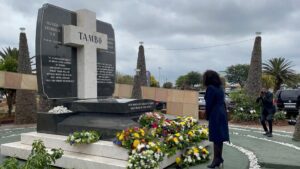
Our gathering then constitutes a solemn moment that delineates a prayer meeting. We collectively recognise our finite earthly reality and take refuge in what often is defined as the immortal or heavenly in reference to Providence. When we pray today, it is not a new thing for the African National Congress, whose umbilical cord runs through the pulpit of a Waaihoek Methodist Church in Bloemfontein for its formation in 1912. When we come to pray and confirm our reliance on the Sovereign unseen yet undeniable God we profess, it is because the ANC’s national anthem constitutes a prayer in which the Trinity of a Christian Godhead is irrevocably acknowledged. When we pray today, it is because no less than 6 of the 13 Presidents of the ANC were either priests or laymen in public acknowledgement of their Christian Faith. So having contextualised the undeniable and pungent relationship the African National Congress from inception shares with the Christian Faith, we turn to engage the subject of our prayer request at this moment.
Ours, as declared by the organisers, is a prayer for a peaceful local government election. But what then is a peaceful election devoid of an appreciation of dignity, respect, love, and compassion for one another? The selfless Mother Theresa taught us: “If we have no peace, it is because we have forgotten we belong to each other.”
Also read: Hope is what we can’t surrender; writes Lindiwe Sisulu
Critical for our gathering and by natural extension for a meaningful life is the theme of peace. Albert Einstein attempted a definition of peace when he said: “Peace is not the absence of war but the presence of a justice of a law of order – in short of government”. So, what then is peace, I hear you retort? Naturally, if this question is raised in any gathering, we are bound to have possibly 100 answers.
Maya Angelou, the USA harbinger, defined peace: “It does not mean to be in a place where there is no noise, trouble or hard work, it means to be in the midst of those things and still be calm in your heart.”
There is little denying that our world is fraught with terror, carnage, mayhem, and these manifest an ever pervasiveness in our borrowed world. Some also explain peace as, “an occurrence of harmony characterised by the lack of violence, conflict behaviours and the freedom from fear of violence”. Peace is thus communal and individual; for Angelou, peace was an internal heart issue. The measurability of peace for Einstein is a recognition and cognisance of the presence of justice, which finds an efficacy in law and order as framed in governance. However, the questions are many, whose justice, what law, and how is order actualised? Existentially we may even ask: What government? Does it imply a democracy? But the world is not a democracy in its totality. Furthermore, democracy, as idealistic as it purports to be, does not automatically guarantee safety or peaceful elections.
Today, in this gathering and in similar gatherings on the eve of this 2021 Local Government Election, we come to pray for peace. We are compelled to inquire what “peaceful” means, and for who. When we talk of peace, it must compel us to enquire as to whether we share a common epistemology on the essence of such peace. Perhaps an even bigger question for us today is, have we afforded ourselves the space and time to develop a common teleology of this assumed peace.
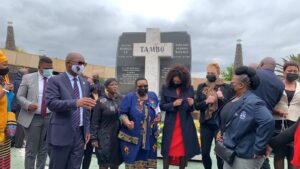
Yet peace is also “commonly understood as the absence of hostility and retribution; peace equally suggests sincere attempts at reconciliation, the existence of healthy or newly- healed interpersonal or international relationships, prosperity, in matters of social or economic welfare, the establishment of equality, and a working political order that serves the true interests of all.” This sounds for some idyllic, even utopian, yet if we truly desire and wish peace for ourselves, it cannot come at the expense of others. Talking peace and working for peace are distinct actions that must not be confused or conflated. The latter engages conditions for peacefulness as measurable in the true interests of all.
Peace is work; to have the ideals of equality and a functional order immanent in responsible and responsive government suggests we must work for its attaining. That work does not exclude all expressions of societal life. In this setting, the SACC must be active in work imperative for peace beyond convening this and other prayer meetings for peaceful elections. Given its history as the surrogate mother of the child Freedom, it cannot allow itself to be captured by any capital interests that decry the complete emancipation understood in political and economic justice for the masses. It warrants being as vocal on the issue of violent capitalism and greed that more than often attests to the central reason for our lack of peace in this borrowed world. It must be consistent in holding all and itself accountable.
When the SACC leads us to pray for peaceful elections, it must be commended. Yet, it must be reminded to maintain its critical distance of reflection from where its prophetic voice may be heard in authenticity. Despite its personal challenges, an organisation must know that beyond the event of an election lays the test of faithfulness to peace in our desisting from being caught in the demon of factionalism that has ANC leaders and politicians in media-led metanarratives of ‘angels’ and ‘demons’. We cannot pray for peace and work against such peace with our very actions of divisiveness. We cannot pray for the peace that must hold the country together while we actively try to destroy each other for personal financial and factional political gain. We dare not advocate for reconciliation in the emptiness of true penitence, and we dare not be captured by the entrapments of capital and render some ANC leaders demons because our personal dislike of something about them is paramount. We dare not call upon the God of peace and yet reject the very things that make for peace, namely justice, compassion, solidarity, and humble servanthood.
Jon Sobrino, the Latin American liberation Scholar, poignantly points out this work ethic for those who claim to believe in God when he asserts, “to believe in God is not just to love life, but to work so that there is life”. Equally so, we as political leaders and leaders across all spheres of a South African societal expression must do more than talk for peace. Since peace attests to a verb, it necessitates work and imbibes a sense of humility that we are fragile, fallible, and hence need mercy. Peaceful elections then is not the task of a supernatural God to the exclusion of those created in God’s image and made in God’s likeness, as God’s Holy Writ teaches us. Peace burdens us to take responsibility and joint accountability with the Creator to work for peace perpetually and incessantly. We are, as the Apostle Paul says, co-workers with God in the creation of a world of peace and justice, and reconciled togetherness.
I wish I could say peace is cheap. But our bludgeoned history attests, and those who, until now 27 years into a democracy under black leadership, still suffer points to how costly peace is. We are naturally reminded of the costliness of peace by the introductory words of Chief Albert Luthuli on his acceptance of the Nobel Peace Prize in 1961, “This year, as in the years before it; [humankind] has paid for the maintenance of peace the price of many lives. It was in the cause of his activities in the interest of peace that the late Dag Hammarskjöld lost his life.”
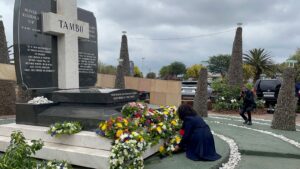
A call to prayer is, therefore, a call to the emptying of self. It’s an acknowledgement of one’s own limited state and lack of knowing a tomorrow. We pray for peaceful elections, and more pertinently, we show our commitment to such peace in an indefatigable need to work for peace. Yes, peace at ANC organisational level as the entrusted leader of a South African society, to return to the landmark values that once defined us in selflessness and dignity where the cause of people dictated our collective agenda. We pray for peace for all those who suffer the marauding mob violence of unemployment, inequality, and poverty. We pray for peace, meaning that their needs are met, and the agenda of the gluttons be laid bare. Peace innately asks, “does my neighbour have bread?”
Peace necessitates supporting South African workers in the rightful quest for a living wage. Peace insists on knowing our military veterans are duly provided. Peace demands we respond to the townships where basic services remain a luxury where we show our faces once in five years. It demands that we show up every week in the five years that we are entrusted to lead. Peace demands the restructuring of a jobless economy to realign its core to serve the masses that remain disenfranchised. Peace unequivocally demands the return of the land to the rightful people and vehemently protests against anything less. Peace necessitates a judiciary that is alive to justice and apt in applying the law, not a judiciary with political and factional interests as its play-dough or serving capital masters. It asks for attuned and recalibrated academic institutions that produce what the nation needs in tertiary and functional relatable certification.
Peace obligates a responsibility on all of us to stop paying lip service to corruption but to be consistent and let all forms of corruption be dealt with in the equality of the law. Peace insists that every gender-based violence and the abuse of our most vulnerable immanent in children and the aged be dealt with in precision. Peace contends for truth and not cheap reconciliation. Peace hopes that we can contest in political office in dignity and maturely disagree in mutual respect. Peace does not make us victims but victorious because we learn to place the interest of others before ours. Prayers for peace means we surrender ourselves to the God of peace and justice, making ourselves available to God with all that we have so that we do what we know God requires: to do justice, to love mercy, and to walk humbly with God.
Also read: WATCH- Lindiwe Sisulu on a campaign trail
I am no theologian, but since we are in a setting of a Christian Faith led by the SACC in this prayer meeting, permit me to lean on the Swiss Calvinist Christian Theologian Karl Barth when he asserts, “The decisive contradiction of the kingdom of God, the one whom we are petitioning for peaceful elections today against all concealed or blatant kingdoms of force is to be seen quite simply in the fact that it invalidates the whole friend-foe relationship between one human and another…. The disciples are told: ‘Love your enemies!’ (Matt. 5:44). This is the end of the whole friend-foe relationship, for when we love our enemy, he ceases to be our enemy. It thus abolishes the whole exercise of force, which presupposes this relationship, and has no meaning apart from it.”
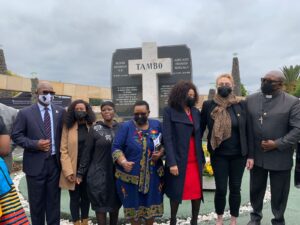
Peace obligates us, therefore, to be truthful. American Civil Rights Leader Louis Farrakhan summed it up so poignantly when he concludes: “There really can be no peace without justice, there can be no justice without truth, and there can be no truth unless someone rises up to tell you the truth.’ Let us tell the truth one to the other, for we liberate not just ourselves, but we strengthen our commitment to set the boundaries of peace.
To this end, I pray we have a peaceful election, but beyond that, I pray that the people of Soshanguve, Ntlenzi, Kanyamazane, Withok, and Pofadder may live peaceful lives since, for us, justice is non-negotiable and truth a friend for life. In the Old Testament Nehemiah, a cupbearer of the King went into mourning upon hearing the news of the destruction of the walls of Jerusalem. He immediately determined to work for the rebuilding of those walls. So peace mourns our lost landmarks of justice equality and selflessness, while it demands of us to find our landmark and build again.
Indeed, Mother Theresa was right. We do not need guns and bombs to bring peace; we need love and compassion. May God Bless South Africa and may her star shine brighter each day.
I thank You.
This is a full version of the keynote speech delivered on Wednesday 27 October by Tourism Minister and ANC NEC member Lindiwe Sisulu at the commemoration ceremony of former ANC president and struggle giant Oliver Reginald Tambo


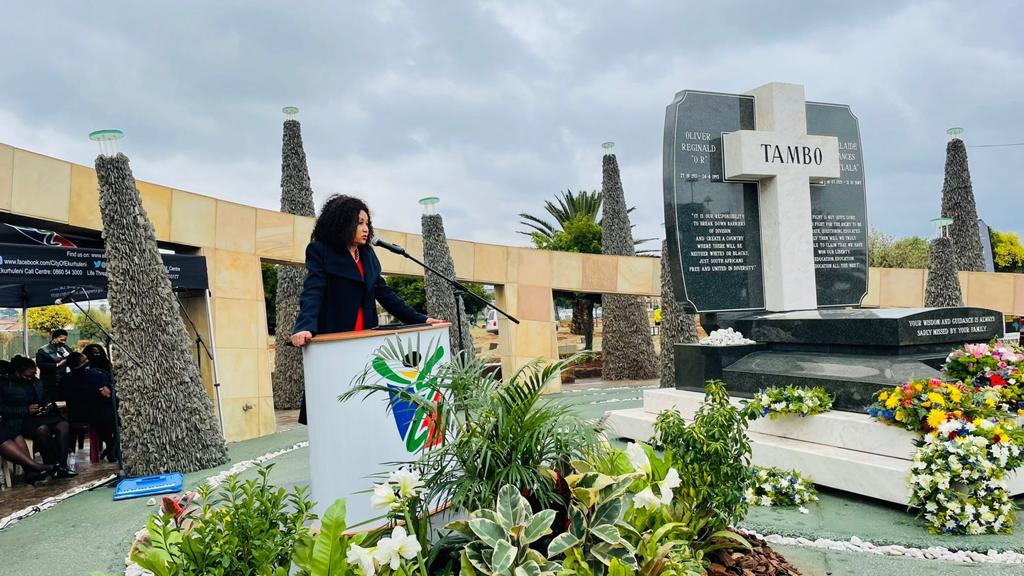
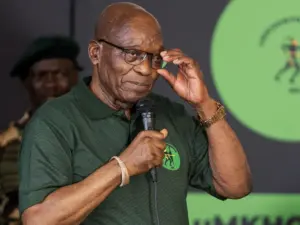
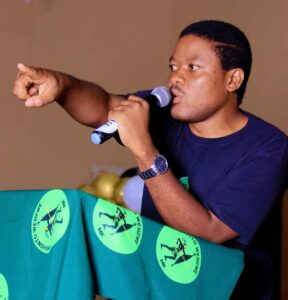



[…] Also read: What is a peaceful election devoid of appreciation of dignity, respect, love and compassion for one … […]
[…] Also read: What is a peaceful election devoid of appreciation of dignity, respect, love and compassion for one … […]
[…] Also read: What is a peaceful election devoid of appreciation of dignity, respect, love and compassion for one … […]